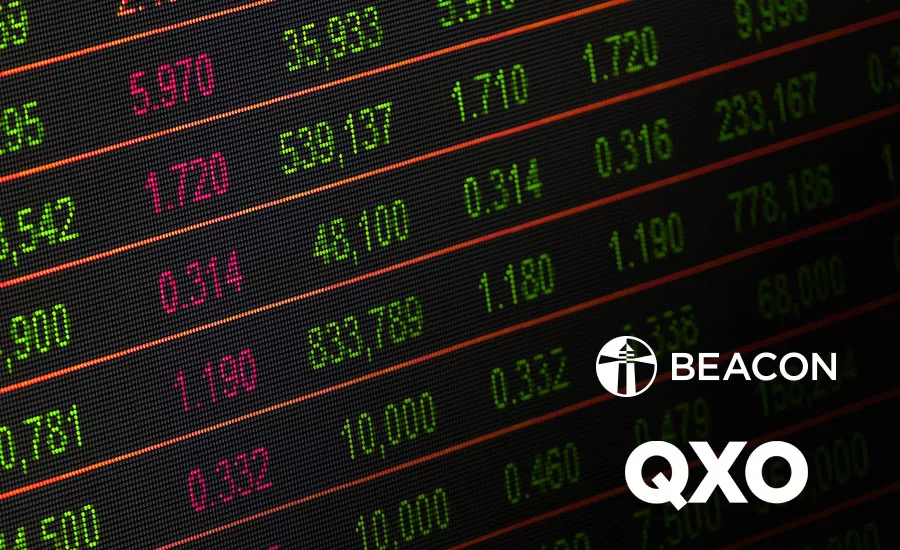Distributor News
Beacon Once Again Rejects $11-Billion Buyout from QXO
Beacon board repeats claims QXO's offer undervalues the company while QXO urges Beacon to let shareholders decide

In the latest back-and-forth between Beacon and QXO, the distributor's Board of Directors issued a formal recommendation to its shareholders to reject QXO's unsolicited offer, officially solidifying its stance that the $11-billion acquisition undervalues the company.
In what has become a public tête-à-tête between the companies, the decision arrived one day before the Feb. 7 deadline set by QXO for Beacon to respond to its offer. First proposed on Nov. 11, 2024, QXO intends to acquire all outstanding shares of Beacon common stock for $124.25 per share in cash. The offer represents a 37% premium to Beacon’s 90-day unaffected volume-weighted average price of $91.02 per share as of Nov. 15, 2024.
“QXO has failed to improve its first and only proposal, which the Board determined significantly undervalues the company and our prospects for growth and value creation,” said Stuart Randle, Beacon’s Chair of the Board. “Beacon offered on multiple occasions to engage with QXO to show a path to increased value, subject to a buyer-friendly non-disclosure agreement that would have preserved QXO’s ability to take the Offer directly to shareholders and run a proxy contest at our 2025 Annual Meeting."
He went on to say that QXO declined "on multiple occasions" to engage with Beacon under the NDA, stating that QXO was not interested in receiving any confidential information about the company and its business.
"The Board remains open to considering all opportunities to maximize shareholder value,” Randle said.
At noon on Feb. 6, Beacon's shares were at $120.98, up by 1.69%.
QXO responded to the board's rejection, claiming that Beacon's board offers "no basis for its assertion" that the offer undervalues Beacon's shares. It pointed to the trading price of Beacon's shares as evidence and urged Beacon to let shareholders decide on its offer.
“Our offer provides certainty, a significant premium in cash and the ability to close quickly with no regulatory delays, financing risks or diligence conditions," said Brad Jacobs, chairman and chief executive officer of QXO. "Beacon’s filing shows no indication of an actionable third-party alternative. We have made a very compelling offer, and Beacon should let its shareholders decide what is in their best interest.”
In a separate news release from the offer rejection, Beacon announced it will hold its fourth quarter and full year 2024 earnings call on Feb. 27. QXO noted that Beacon confirmed it would wait to announce its 2028 financial projections until March 13, more than a month from Feb. 6 and more than three months from the Board’s initial rejection of QXO‘s offer.
"There is no reason for Beacon to introduce yet another delay by waiting to disclose its newly formulated projections," the company said in a news release.
On Jan. 24, QXO initiated what's been deemed a "hostile takeover" of Beacon, aiming to sidestep the Board of Directors and making the case to Beacon's shareholders directly. QXO set a deadline to acquire all outstanding company shares at a "notable premium" by Feb. 24. The transaction is not subject to any financing conditions or due diligence conditions, QXO said.
In response, Beacon took a "poison pill" approach, a defense strategy companies used to prevent or discourage hostile takeovers that typically involves measures that make an acquisition more expensive or less attractive to the acquiring company. This took the form of Beacon’s Board of Directors unanimously adopting a limited-duration stockholder rights agreement to protect the company and its shareholders from QXO, Inc.'s unsolicited $11 billion takeover bid.
The agreement allows one preferred share purchase right for each share of common stock held by stockholders recorded as of Feb. 7. These rights can be exercised when an entity obtains 15% or more of Beacon's common stock without the board's consent.
“The only thing stopping shareholders from acting to get cash expeditiously is the decision by Beacon’s Board to adopt a poison pill," said Jacobs. "We are prepared to take all necessary steps to complete this transaction promptly and deliver significant and immediate value to Beacon shareholders.”
Screencap from Yahoo Finance.
Is the Offer Undervaluing Beacon?
As reported by RC's Byan Gottlieb in a thorough analysis of QXO's offer, analysts agree that Beacon’s intrinsic value exceeds $124.25 per share, with target prices clustering around $130–$136. Beacon’s operational improvements, strategic positioning in the roofing supply market, and potential as an anchor asset for strategic acquirers justify a higher valuation.
This being the case, QXO has options to consider. It can raise its bid closer to the $130 per share range, which would both alleviate Beacon's concerns of being undervalued while still offering shareholders, as Jacobs put it, "a significant premium in cash." There is also the consideration of other interested parties that increases pressure on QXO, though as Jacbos contends, there appears to be no active third-party alternative.
Since the beginning of 2022, through its Ambition 2025 plan, Beacon has delivered above-market growth and financial and operational results, including 11 straight quarters of record net sales. Beacon has announced its Investor Day will be held in New York City on March 13.
In the filing issued by Beacon with the U.S. Securities and Exchange Commission, the company continued to offer fiery rebuttals of QXO's offer, saying it should be shareholders, not QXO, that benefits from an acquisition.
"The Offer represents an opportunistic effort by QXO to acquire a 'crown jewel' of the industry with elite M&A and greenfield capabilities, while paying the company’s shareholders an inadequate price in return," Beacon said in a news release.
QXO states it plans to become a tech-forward leader in the $800 billion building products distribution industry, targeting tens of billions of dollars of annual revenue in the next decade through accretive acquisitions and organic growth.
Looking for a reprint of this article?
From high-res PDFs to custom plaques, order your copy today!





.webp?height=200&t=1736971066&width=200)
.webp?height=200&t=1742480493&width=200)


